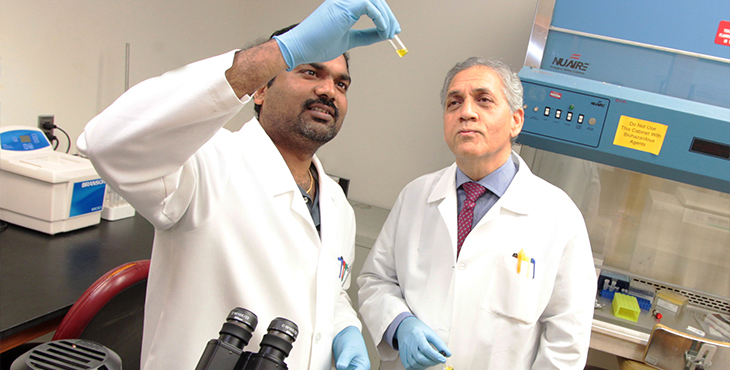Above: Drs. Rakesh Meka (left) and Kamal Moudgil and their team at the Baltimore VA Medical Center and University of Maryland are developing a targeted drug therapy to treat painful joints without affecting other tissues. (Photo by Mitch Mirkin)
Baltimore VA Medical Center researchers have developed a technique to deliver arthritis medication primarily to the joints, and successfully tested it in lab rats.
The new technique involves encasing medication in a molecular structure that homes in on inflamed joints. The method gets the drugs where they need to go without affecting the rest of the body. This lowers the risk of unwanted side effects.
The medication is injected into the bloodstream, and is then directed to inflamed joints. When given to rats, the therapy was more effective at stopping arthritis than other modes of treatment with the same drug.
“This research is a fine example of how nanotechnology-based targeted drug delivery can lead to more effective and safe treatment of a painful and debilitating disease like arthritis,” said Dr. Kamal Moudgil, senior scientist behind the work. He is a researcher at the Baltimore VA and a professor of microbiology and immunology at the University of Maryland School of Medicine.
His group’s results appeared online in April in the journal Nanomedicine.
Rheumatoid arthritis involves chronic inflammation of the joints. It can lead to joint damage and deformity. The disease affects about 1.3 million Americans. A recent study identified some 120,000 Veterans with the condition who used VA care between 2000 and 2018.
One common rheumatoid arthritis drug, dexamethasone, can cause problems with the gastrointestinal, cardiovascular, musculoskeletal, and metabolic systems.
The Baltimore researchers encased this drug in a liposome—a spherical molecule made mostly of fats. This was in turn coated in another molecule, ART-2, which is drawn to inflamed joints.
Rats given the therapy showed significantly less toxic effect from the drug than with other delivery methods. The therapy also showed improvements in arthritis relief, based on measurements of swelling in the rats’ paws.
Methods like these are being widely studied to treat cancer, as well as other autoimmune diseases, such as lupus. Moudgil’s team wrote, “The future appears bright for this growing field.”
To read more about this study, visit VA Research Currents. To learn more about other VA research in this area, visit our web topic page on arthritis.
Topics in this story
More Stories
Diverse representation of women in health care research allows MVP to make discoveries for women’s health
Join the Million Veteran Program online. You will have the option to receive an at-home blood sample collection kit in the mail.
VHA's new podcast series, New Horizons in Health, features a candid discussion of psychedelic assisted therapies for Veterans experiencing mental health conditions.






